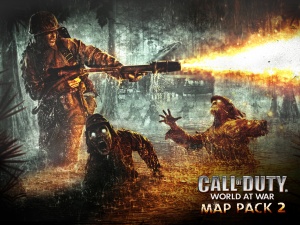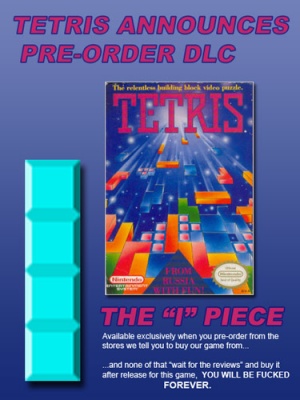Downloadable Content in Video Games
Downloadable Content, or DLC, as it is commonly referred to in the gaming community, is a form of digital media marketed as supplemental content for video games that is optional and available separately from the game itself.
Contents
Background
User Created Content
Some games provide applications for modifying in-game characters, environments, and game modes to the specifications of the end-user. One example of user driven DLC is the creation of texture packages to improve graphics in games, such as NewVision for Deus Ex. Other content users make are custom maps and game modes, such as the racing maps on Halo:Reach[1] or various tower or fortress defense maps in the Starcraft and Warcraft Series[2], from which games like DotA and Wintermaul originate.
However, there are games that are completely driven by user created content, such as Goldeneye Source[3] and Garry's Mod. Goldeneye was created using Valve's Source SDK, which when paired with third party applications, can be used to create whole new character, environment, and object models within the source game engine. In this particular case, modders developed a newer lookalike shooter based on the popular N64 title 'Goldeneye'. Once users finish creating their designs, they can then upload their models and specific game settings in custom Valve servers to play with others online.
Garry's Mod[4] is a sandbox physics game where players have total control over their environment by using a tool gun and a physics gun to create and manipulate objects within the game space. Given so much freedom in Garry's Mod, players can make and play a variety of game scenarios such as a mafia party game and an aerial combat game mode. Some players have even created scripts for non-player entities, making the possibility of RPG type of mods possible. Because of the level of control in GMod, modders can sometimes find themselves riding a fine line between socially acceptable and inappropriate content.
Developer Created Content
Developers also provide downloadable content to consumers, available separately from the original game. Developer created content tends to be new maps and game modes. Notable examples of developer provided DLC are the Call of Duty: World at War zombie Map Packs[5] "Shi no Numa" and "Der Riese', the Halo 3 "Legendary" and the "Mythic" map packs, and Fallout:3 and Fallout: New Vegas DLC, which allows players to explore new areas and play more quests.
Sometimes, developers don't just release DLC long after the game has been released, but the same day that the game is released. Known as "Release day DLC" [6], developers have started a recent trend of allowing players to unlock special in game items for paying a little bit more than the retail value of the game using a special code.
Criticism and Ethics
Pricing
The DLC is user generated content that is not sancition by the developers. Due to certain copyrights on the use of the programs, user generated DLC must not be sold for money. User produced DLC is free to users.
Developer produced DLC is priced differently depending on the game type, developers, and the platform of distribution. Companies, such as Valve, releases DLC for PC games for free for unknown reasons [tag]. However, on the console ports of their games, Valve maintains a regulated pricing scheme. Other companies, such as Bioware, and EA have equal pricing of DLC for both consoles and PCs.
Pricing also depends on your geographic location and the specific content distribution platform. Areas outside of the US like Australia and the UK tend to pay a higher premium for extra and sometimes more censored game content, costing games from 50% to 100% more than the US counterparts for the same content. Despite location, PC gamers have the luxury of natively being able to use an internet browser to purchase and their DLC directly to their computer. On the other hand, console games have to buy discrete amounts of platform specific "points" to pay for their DLC, such as Microsoft Points for xbox gamers.
Unlocking
One of the more vocal complaints from the gaming community is that DLC oftentimes isn't newly developed environments and game modes, but rather, a code that unlocks environments, items, and objects that were already available in the game. This brings up the ethical issue of making consumers who unknowningly paid for most of the game pay a little bit more to unlock the rest of it. Gears of War 3 [7] is a recent example of granting players and advantage at the cost of some money for the DLC.
Opposition
The most recent boycott of DLC is the Battlefield 3 boycott [8]. Due to the growing trend of developers like EA and Bioware releasing "extra content" to be unlocked off of the original game, many fans felt it was unfair to let those who pay more have an advantage - especially in online play. Within the online news aggregation site Reddit, the user Ramphastid posted a proposition to boycott Battlefield 3 unless EA decides to drop the launch-day DLC.
As this proposition spread through Facebook, Twitter, and by reaching the front page on Reddit, EA heard the message loud and clear. Eventually, the game developer backed down and released a statement saying that any DLC for Battlefield 3 would be free.
In November 2011, Nintendo published a statement via an interview with AOL Games that stated:
“When we sell a game, we want the consumer to feel that they’ve had a complete experience. We’re unwilling to sell a piece of a game upfront and, if you will, force a consumer to buy more later. That’s what [Nintendo representatives] don’t want to do, and I completely agree. I think the consumer wants to get, for their money, a complete experience, and then we have opportunities to provide more on top of that.” [9]
Judging from this statement, Nintendo firmly believes that a game should be sold as a complete product providing the full experience from the get go - all content on the disc as accessible to the consumer without paying anything extra. Because most gaming companies digress from this business model, Nintendo stands in the minority for opposing DLC.
The Hot Coffee Mod
Sometimes people create DLC that emulates pornographic situations, such as the Hot Coffee Mod [10] in Grand Theft Auto: San Andreas which picked up a lot of media attention debating the game's ESRB rating and the decision of whether it should be sold in stores since it was so racy.
See also
References
- ↑ http://www.gamepro.com/article/previews/215900/halo-reach-forge-world/
- ↑ http://warcraft3.filefront.com/
- ↑ http://www.moddb.com/mods/goldeneye-source
- ↑ http://store.steampowered.com/app/4000/
- ↑ http://www.joystiq.com/2009/02/10/call-of-duty-world-at-war-map-pack-coming-in-march/
- ↑ http://elder-geek.com/2011/06/the-question-block-release-day-dlc/
- ↑ http://www.trueachievements.com/n5522/gears-of-war-3-weapon-skins-dlc-confirmed.htm
- ↑ http://www.reddit.com/r/gaming/comments/hy24b/battlefield_3_preorder_dlc_boycott_coordination/
- ↑ http://gamersxtreme.org/2011/11/18/nintendo-stands-tall-against-dlc/
- ↑ http://www.gamespot.com/news/6129301/confirmed-sex-minigame-in-ps2-san-andreas

